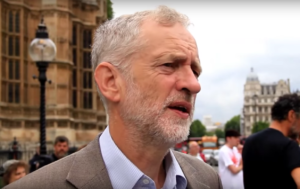Jeremy Corbyn Remains Labour Party Leader
Despite a vote of no confidence by his fellow members of Parliament (MPs) on September 24, Jeremy Corbyn has retained his position as Labour Party leader. He had previously assumed leadership on September 2015 after the resignation of Ed Miliband following the party’s defeat in the country’s general election.

Regarded as a fringe candidate in the 2015 general election, Corbyn’s victory, announced on September 12 of that year was widely regarded as a surprise, despite him winning 59.5 percent of the party vote. However, Corbyn’s first year was marred with controversy and disappointment, notably that his fellow Labour MPs neither agreed with his far-left policies nor with his style of leadership. The discontent reached its peak during the European Union Referendum in June 2016. After Britons voted to leave the EU, many accused Corbyn of leading a lackluster, weak Remain campaign, according to The Guardian.
In an action of severe defiance, as The Guardian reported, the majority of Corbyn’s Shadow cabinet members orchestrated a mass resignation, leaving the 67-year-old pitted against fellow leftist Owen Smith and in contention for a whole new leadership just a year after his initial appointment. Regarded as the favorite in this campaign, Corbyn was expected to be able to maintain his position. Ultimately, on September 24, the results formally showed that Corbyn won a landslide victory, amassing 61.8 percent of the party vote, according to The Telegraph. This support ensures that Corbyn will remain party leader until 2020.
Corbyn’s re-election will surely have a significant impact on the future of both the Labour Party and British politics, at least for the next few years. Mr. Corbyn’s intention, as noted by BBC News, to "wipe the slate clean and move forward," alludes to a selection of new and improved plans he has proposed going into his new tenure as party leader.
According to The Telegraph, Corbyn’s plans include allocation of funds and aid to “countries facing crisis,” investment in national infrastructure, council housing projects, and privatization of the National Health Service, among others.
Yet, as The Guardian reported, the Labour Party is still divided on such issues, and many consider Corbyn’s re-election will lead his party into further dissent. Many believe that his plans, if enacted, will prove to be extremely risky and potentially detrimental to Britain’s public and private sectors. According to The Telegraph, economists and Labour Party donors have criticized Corbyn’s plans to inject £500 billion into British infrastructure as part of his 2020 general election manifesto. Popular Labour Party donor and economist John Mills warned that Corbyn’s investment plans may have negative consequences.
While the immediate effects of Corbyn’s re-election remain to be seen, it is fair to say that the activities of the Labour Party in the coming months will surely have an impact on its position in British politics and, by extension, its revival as a significant political force, with Corbyn heading the charge.
